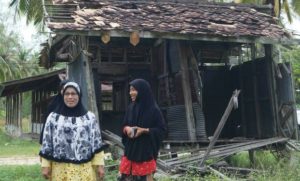Thai Deep South: Old ‘Commando’ School Could Become Islamic Learning Center

Pattani, 19 Sya’ban 1437/27 May 2016 (MINA) – An old school site in Thailand’s Deep South, which authorities seized over allegations that it was used for training local insurgents, may be turned into an Islamic educational center, says a committee tasked with exploring future uses for the property.
But members of a family that owned the property are resisting this possibility, saying they want their land back.
The school in Pattani province’s Yaring district has not operated since May 2005, when former headmaster Doonloh Wae-mano fled to neighboring Malaysia amid allegations by the Thai military that he was conducting weapons-training sessions for young insurgents. Officials nicknamed the site the “commando school.”
Doonloh, according to the military, served as the deputy leader of a combat training unit for Barisan Revolusi Nasional (BRN), the most active of armed separatist groups in Thailand’s Muslim-majority Deep South.
The Thai government formed a committee of clerics, area residents and officials to find a future use for the property, after a court in December 2015 ordered that the deed for the 5.5-acre property be voided and the land revert to state ownership because the land had been used for terrorist activities.
Wae-mano’s son, Balyan, said he ignored an invitation to sit on this committee because he was angry.
“The provincial governor had asked me to be a member of the committee to find a solution to Pondok Jihad [school] but I did not respond …. I don’t want to deal with them,” Balyan told BenarNews by phone.
Meanwhile, an official involved in developing plans for the old school site’s future use, touched on some of them in an interview with BenarNews.
“We may turn the premise into Islamic learning center, a new Pondok (religious) school or pre-Haji preparation center,” Kitti Surakanghaeng said.
Money raised to help family
Doonloh’s wife, Yawahee Wae-mano, challenged the government’s seizure of the land, claiming that her father started the school and was its owner. Her husband served as headmaster, but never had ownership. According to Yawahee , when her father died, the land and school should have reverted to his heirs – herself and four siblings.
In mid-February, the family moved from the old school grounds to Tha Dan mosque on the other side of their village in Yaring district.
To help the family, the community held a feast in March at a local sports facility. More than 10,000 people attended and a group of local artists joined the fundraising effort by painting the old Jihad Witaya school and contributing to the fund.
The effort raised about 4.1 million baht (U.S. $116,660) from attendees from Thailand and nearby Malaysia.
Tha Dan mosque Imam Muhammad Nawawi Abdulkadir said 2.1 million baht (U.S. $59,747) would go to the family to purchase land and build a house. Some money would go to the mosque’s renovation and a building (that could be part of the mosque itself or a new religious school).
School seizure linked to recent violence?
The seizure of the school property could even have contributed to an uptick in deadly attacks by suspected insurgents that have occurred since early February and amid efforts by the Thai junta to open formal peace talks with rebel groups, a military commander in the region suggested recently.
“The violence that followed the court order to freeze the Jihad Witaya School has caused a great obstacle to peace talk efforts,” Maj. Gen. Shinawat Mandej, deputy commander of the 4th Army Regional command, and who is a member of the Thai delegation, told reporters last month.
In late April, Thai officials said that the peace process was still alive after the rebel delegation accused the Thai side of refusing to agree to mutual terms needed to advancing the process. Thai officials said that a limited ceasefire had to be in place before Thailand could agree to those terms.
Shinawat added that he hoped that the communities of Malay-Patani could understand why the government had to seize the Jihad Witaya School.
“When the group using this issue for violence subsides, at the end of the day, peace talks can go on,” Shinawat said.
More than 6,500 people have been killed in violence associated with the insurgency since it reignited in 2004. Since February, at least 37 people have been killed in shootings and bombings carried out by suspected rebels in the Deep South, according to officials. T/R07/R01)
Mi’raj Islamic News Agency (MINA)



